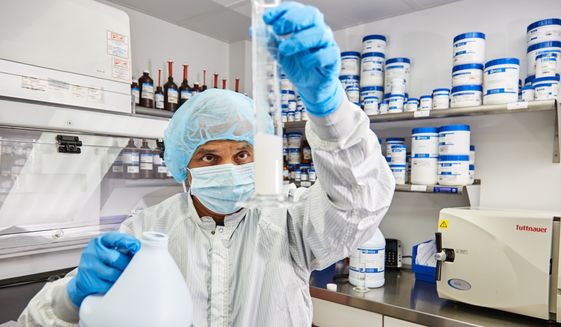
An international poll of more than 6,000 doctors released Thursday found that the antimalarial drug hydroxychloroquine was the most highly rated treatment for the novel coronavirus.
The survey conducted by Sermo, a global health care polling company, of 6,227 physicians in 30 countries found that 37% of those treating COVID-19 patients rated hydroxychloroquine as the “most effective therapy” from a list of 15 options.
The U.S. Food and Drug Administration gave chloroquine and its next-generation derivative, hydroxychloroquine, emergency-use authorization Monday for treating the novel coronavirus, although the drug was already being used off-label by some doctors and hospitals for COVID-19 patients.
The survey also found that the most commonly prescribed treatments are analgesics (56%), azithromycin (41%) and hydroxychloroquine (33%).
Azithromycin, known by the brand name Zithromax or Z-Pak, was rated the second-most effective therapy at 32%, followed by “nothing,” analgesics (including acetaminophen), anti-HIV drugs and cough medicine.
Hydroxychloroquine, which is sold under the brand name Plaquenil, was prescribed mainly in the United States for the most severe cases, but not so in other countries.
“Outside the U.S., hydroxychloroquine was equally used for diagnosed patients with mild to severe symptoms whereas in the U.S. it was most commonly used for high risk diagnosed patients,” the survey found.
The 30 nations surveyed included those in Europe, Asia, North America and South America, as well as Australia. No incentives were provided to participate in the poll, conducted March 25-27, according to Sermo.
ANNOUNCEMENT: To create a centralized & dynamic knowledge base we published results of our COVID-19 study, which over 6.2K physicians in 30 countries participated in: buff.ly/3bLFUTr
56 people are talking about this
Hydroxychloroquine usage was most widespread in Spain, where 72% of physicians surveyed said they had prescribed it, followed by Italy at 49%, and least popular in Japan, where 7% had used it to treat COVID-19.
The poll found 23% of U.S. medical professionals had prescribed the drug, which has been FDA-approved for malaria, lupus and rheumatoid arthritis.
Debate about hydroxychloroquine has raged in the United States since President Trump touted it two weeks ago as a potential “game-changer” in the fight against the deadly pandemic, prompting critics to accuse him of peddling unproven remedies, or “snake oil,” as USA Today put it.
Trump-touted malaria drug takes center stage in coronavirus treatment fracas - go.shr.lc/2UT6OSx - @washtimes #hydroxychloroquine #chloroquine #COVID19
136 people are talking about this
Sermo CEO Peter Kirk called the polling results a “treasure trove of global insights for policy makers.”
“Physicians should have more of a voice in how we deal with this pandemic and be able to quickly share information with one another and the world,” he said. “With censorship of the media and the medical community in some countries, along with biased and poorly designed studies, solutions to the pandemic are being delayed.”
The survey also found that 63% of U.S. physicians believe restrictions should be lifted in six weeks or more, and that the epidemic’s peak is at least 3-4 weeks away.
The survey also found that 83% of global physicians anticipate a second global outbreak, including 90% of U.S. doctors but only 50% of physicians in China.
On average, U.S. coronavirus testing takes 4-5 days, while 10% of cases take longer than seven days. In China, 73% of doctors reported getting rest results back in 24 hours.
In cases of ventilator shortages, all countries but China said the top criteria should be patients with the best chance of recovery (47%), followed by patients with the highest risk of death (21%), and then first responders (15%).
In China, the survey said doctors prioritized patients at greatest risk of death.






No comments:
Post a Comment